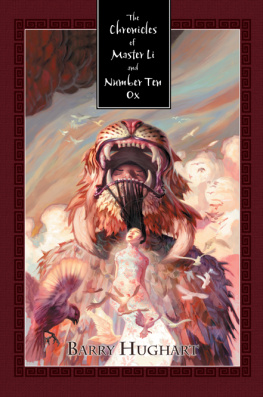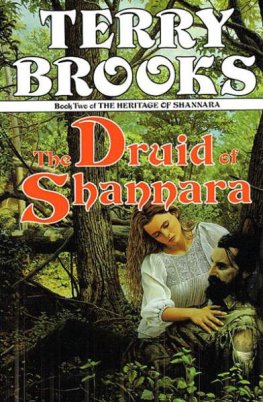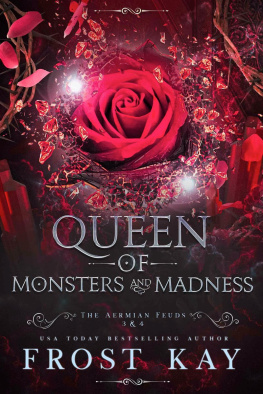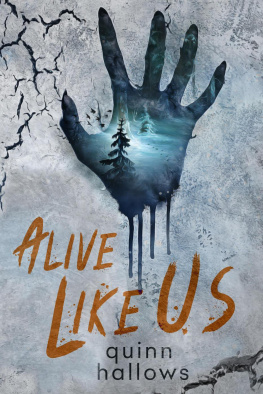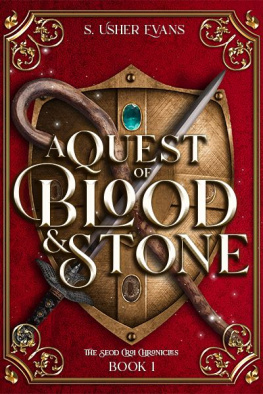BRIDGE OF BIRDS
A Novel of an Ancient China That Never Was
by Barry Hughart
Caveat Oriens
prolepsis (pr lep sis), n., pl. -ses(-sz). 1. Rhet. the anticipation of possible objections in order to answer them in advance. 2. the assigning of a person, event, etc., to a period earlier than the actual one.
The Random House Dictionary of the English Language
Caveat Occidens
Chen. To stand still. To gallop at full speed.
Wan. A small mouth. Some say a large mouth.
Ch'he. Devoid of intelligence, deficiency of wit, silly, idiotic. Also used for borrowing and returning books.
Pee. A dog under the table.
A dog with short legs.
A short-headed dog.
Maou Tsaou. A scholar not succeeding and giving himself over to liquor.
The Chinese Unicorn, edited, from Chinese-English dictionaries, by Thomas Rowe; printed for Robert Gilkey (private circulation).
I shall clasp my hands together and bow to the corners of the world.
My surname is Lu and my personal name is Yu, but I am not to be confused with the eminent author of The Classic of Tea. My family is quite undistinguished, and since I am the tenth of my father's sons and rather strong I am usually referred to as Number Ten Ox. My father died when I was eight. A year later my mother followed him to the Yellow Springs Beneath the Earth, and since then I have lived with Uncle Nung and Auntie Hua in the village of Ku-fu in the valley of Cho. We take great pride in our landmarks. Until recently we also took great pride in two gentlemen who were such perfect specimens that people used to come from miles around just to stare at them, so perhaps I should begin a description of my village with a couple of classics.
When Pawnbroker Fang approached Ma the Grub with the idea of joining forces he opened negotiations by presenting Ma's wife with the picture of a small fish drawn upon a piece of cheap paper. Ma's wife accepted the magnificent gift, and in return she extended her right hand and made a circle with the thumb and forefinger. At that point the door crashed open and Ma the Grub charged inside and screamed: Woman, would you ruin me? Half of a pie would have been enough!
That may not be literally true, but the abbot of our monastery always said that fable has strong shoulders that carry far more truth than fact can.
Pawnbroker Fang's ability to guess the lowest possible amount that a person would accept for a pawned item was so unerring that I had concluded that it was supernatural, but then the abbot took me aside and explained that Fang wasn't guessing at all. There was always some smooth shiny object lying on top of his desk in the front room of Ma the Grub's warehouse, and it was used as a mirror that would reflect the eyes of the victim.
Cheap, very cheap, Fang would sneer, turning the object in his hands. No more than two hundred cash.
His eyes would drop to the shiny object, and if the pupils of the reflected eyes constricted too sharply he would try again.
Well, the workmanship isn't too bad, in a crude peasant fashion. Make it two-fifty.
The reflected pupils would dilate, but perhaps not quite far enough.
It is the anniversary of my poor wife's untimely demise, the thought of which always destroys my business judgment, Fang would whimper, in a voice clotted with tears. Three hundred cash, but not one penny more!
Actually no money would change hands because ours is a barter economy. The victim would take a credit slip through the door to the warehouse, and Ma the Grub would stare at it in disbelief and scream out to Fang: Madman! Your lunatic generosity will drive us into bankruptcy! Who will feed your starving brats when we are reduced to tattered cloaks and begging bowls? Then he would honor the credit slip with goods that had been marked up by 600 percent.
Pawnbroker Fang was a widower with two children, a pretty little daughter we called Fang's Fawn and a younger son that we called Fang's Flea. Ma the Grub was childless, and when his wife ran off with a rug peddler his household expenses were cut in half and his happiness was doubled. The happiest time of all for the team of Ma and Fang was our annual silk harvest, because silkworm eggs could only be purchased with money and they had all the money. Ma the Grub would buy the eggs and hand them out to each family in exchange for lOUs that were to be redeemed with silk, and since Pawnbroker Fang was the only qualified appraiser of silk for miles around they were able to take two-thirds of our crop to Peking and return with bulging bags of coins, which they buried in their gardens on moonless midnights.
The abbot used to say that the emotional health of a village depended upon having a man whom everyone loved to hate, and Heaven had blessed us with two of them.
Our landmarks are our lake and our wall, and both of them are the result of the superstition and mythology of ancient times. When our ancestors arrived in the valley of Cho they examined the terrain with the greatest of care, and we honestly believe that no village in the world has been better planned than the village of Ku-fu. Our ancestors laid it out so that it would be sheltered from the Black Tortoise, a beast of the very worst character, whose direction is north and whose element is water and whose season is winter. It is open to the Red Bird of the south, and the element of fire and the season of summer. And the eastern hills where the Blue Dragon lives, with the element of wood and the hopeful season of spring, are stronger than the hills to the west, which is the home of the White Tiger, metal, and the melancholy season of autumn.
Considerable thought was given to the shape of the village, on the grounds that a man who built a village like a fish while a neighboring village was built like a hook was begging for disaster. The finished shape was the outline of a unicorn, a gentle and law-abiding creature with no natural enemies whatsoever. But it appeared that something had gone wrong because one day there was a low snorting sort of a noise and the earth heaved, and several cottages collapsed and a great crack appeared in the soil. Our ancestors examined their village from every possible angle, and the flaw was discovered when one of them climbed to the top of the tallest tree on the eastern hills and gazed down. By a foolish oversight the last five rice paddies had been arranged so that they formed the wings and body of a huge hungry horsefly that had settled upon the tender flank of the unicorn, so of course the unicorn had kicked up its heels. The paddies were altered into the shape of a bandage, and Ku-fu was never again disturbed by upheavals.
They made sure that there would be no straight roads or rivers that might draw good influences away, and as a further precaution they dammed up the end of a narrow little valley and channeled rivulets down the sides of the hills, and thus produced a small lake that would capture and hold good influences that might otherwise trickle away to other villages. They had no aesthetic intent whatsoever. The beauty of our lake was an accident of superstition, but the result was such that when the great poet Ssu-ma Hsiang-ju passed through on a walking trip five hundred years ago he paused at the little lake and was inspired to write to a friend:
The waters are loud with fish and turtles,
A multitude of living things;
Wild geese and swans, graylags, bustards,
Cranes and mallards,
Loons and spoonbills,
Flock and settle on the waters,
Drifting lightly over the surface,
Buffeted by the wind,
Bobbing and dipping with the waves,
Sporting among the weedy banks,


